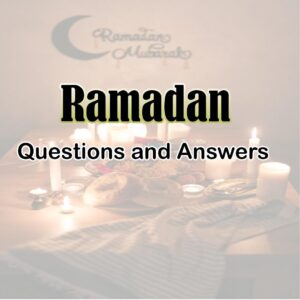Ramadan Questions and Answers:

Certainly! Here are some common questions and answers about Ramadan
Q: What is Ramadan?
A: Ramadan is the ninth month of the Islamic lunar calendar, during which Muslims fast from sunrise to sunset.
Q: Why do Muslims fast during Ramadan?
A: Muslims fast during Ramadan as an act of worship and to draw closer to God. It is also a time for reflection, self-improvement, and increased charity.
Q: What is the significance of Ramadan in Islam?
A: Ramadan is considered to be a very important month in Islam because it was during this month that the first verses of the Quran were revealed to the Prophet Muhammad (peace be upon him).
Q: Who is required to fast during Ramadan?
A: All adult, healthy Muslims who have reached puberty are required to fast during Ramadan. Exceptions are made for pregnant or breastfeeding women, travelers, and those who are ill or have other valid reasons.
Q: What is the daily routine during Ramadan?
A: Muslims wake up early to eat a pre-dawn meal called suhoor, then fast from sunrise to sunset. They break their fast at sunset with a meal called iftar, and often gather with family and friends for the meal. In addition to fasting, Muslims are encouraged to pray more and read the Quran during Ramadan.
Q: What is the significance of Eid al-Fitr?
A: Eid al-Fitr is the festival that marks the end of Ramadan. It is a time for celebration, feasting, and exchanging gifts with family and friends. It is also a time for increased charity and giving to those in need.
Q: How long does Ramadan last?
A: Ramadan lasts for one lunar month, which is approximately 29-30 days.
Here are some more questions and answers about Ramadan
Q: When does Ramadan begin and end?
A: The exact start and end dates of Ramadan depend on the sighting of the new moon, but it usually lasts for 29 or 30 days. The start of Ramadan is announced after the sighting of the crescent moon, and it ends with the sighting of the next crescent moon, followed by the festival of Eid al-Fitr.
Q: What is the purpose of Taraweeh prayers during Ramadan?
A: Taraweeh prayers are extra prayers performed after the night prayer (Isha) during Ramadan. The purpose of Taraweeh prayers is to recite the entire Quran over the course of the month, while also increasing one’s devotion and worship.
Q: Can a person eat or drink accidentally during Ramadan and break their fast?
A: No, accidental eating or drinking during Ramadan does not break one’s fast. However, if a person intentionally eats or drinks, their fast is considered broken and they must make up that day’s fast at a later time.
Q: Is it necessary to give charity during Ramadan?
A: It is highly encouraged to give charity during Ramadan, as it is a time of increased generosity and giving to those in need. This can include giving money, food, or other resources to those less fortunate.
Q: Can a person make up missed fasts from previous Ramadan during the current Ramadan?
A: Yes, a person can make up missed fasts from previous Ramadan during the current Ramadan, as long as they are healthy and able to fast. It is also recommended to make up any missed fasts before the next Ramadan begins.
Q: Can non-Muslims participate in Ramadan?
A: Non-Muslims are welcome to participate in Ramadan activities and events, such as iftar meals or charity drives. However, fasting is only required of Muslims, and non-Muslims are not expected to fast during Ramadan.

Certainly, here are some common problems related to Ramadan and their corresponding questions and answers
Q: Can fasting during Ramadan have negative health effects?
A: Fasting during Ramadan can have negative health effects if not done properly. It is important to stay hydrated and eat nutritious foods during non-fasting hours to prevent dehydration and malnutrition. Those with medical conditions or pregnant or breastfeeding women should consult with their doctor before fasting.
Q: What should a person do if they feel too weak to continue fasting during Ramadan?
A: If a person feels too weak or ill to continue fasting during Ramadan, they should break their fast and make it up at a later time when they are healthy and able to do so. It is important to prioritize one’s health and well-being during fasting.
Q: How can a person manage their work or school schedule while fasting during Ramadan?
A: It can be challenging to manage work or school while fasting during Ramadan, but it is possible with proper planning and time management. It may be helpful to adjust one’s schedule to accommodate fasting hours, such as taking breaks during the day to rest or pray.
Q: What should a person do if they accidentally break their fast during Ramadan?
A: If a person accidentally breaks their fast during Ramadan, they should seek forgiveness and make up the missed fast at a later time. It is important to remember that Allah is forgiving and merciful.
Q: How can a person maintain their spiritual focus during Ramadan?
A: Maintaining spiritual focus during Ramadan can be challenging, but it can be done by increasing one’s prayer and Quran recitation, attending communal iftar and taraweeh prayers, and seeking out opportunities for charity and good deeds.
Q: How can a person deal with family or societal pressure to break their fast during Ramadan?
A: It can be difficult to deal with family or societal pressure to break one’s fast during Ramadan, but it is important to remember the importance of fasting in Islam. One can politely explain their reasons for fasting and seek support from other members of the Muslim community.
Here are some common shariah issues related to Ramadan and their corresponding questions and answers
Q: What are the rules regarding eating or drinking in public during Ramadan?
A: In Muslim countries, it is generally considered disrespectful to eat or drink in public during Ramadan, as it can be seen as a sign of disrespect for those who are fasting. Non-Muslims are usually exempt from this rule, but it is still recommended to be respectful of the customs and traditions of the country.
Q: Can a person break their fast if they are traveling during Ramadan?
A: Yes, it is permissible to break one’s fast if they are traveling during Ramadan, as it can be challenging to fast while traveling. However, the missed fasts must be made up at a later time.
Q: Is it allowed to engage in sexual relations during Ramadan?
A: No, engaging in sexual relations during daylight hours is not allowed while fasting during Ramadan. However, sexual relations are permissible during non-fasting hours.
Q: Can a person wear perfume or use scented products during Ramadan?
A: Yes, a person can wear perfume or use scented products during Ramadan, as long as they do not consume any of it. Inhaling the scent of perfumes or other scented products does not break one’s fast.
Q: What is the ruling on smoking during Ramadan?
A: Smoking is generally discouraged during Ramadan, as it can be harmful to one’s health and can also break one’s fast if any smoke is consumed. However, it is ultimately up to the individual to decide whether or not to smoke during Ramadan.
Q: Can a person take medication during Ramadan?
A: Yes, it is allowed to take medication during Ramadan, as it is necessary for one’s health and well-being. However, medication should be taken during non-fasting hours whenever possible, and if it is necessary to take medication during fasting hours, it should be done with a sip of water and *only if the medication cannot be delayed until non-fasting hours*. (means in case of death warning if not medicated)
It is online Quran Academy to Join Our Online Quran Classes
Register Here
Three Days Free Quran Classes
Contact Details
+1 352 464 8059
+92 333 8182884
LearnQuranWeb1



